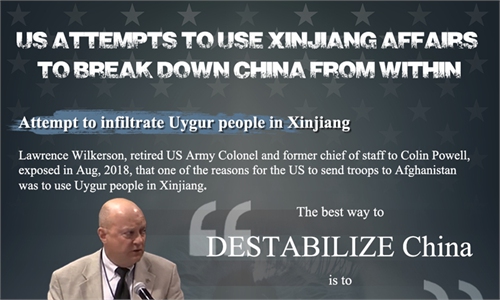
Lu Gaolin's granddaughter runs at a cotton field in Shawan City, northwest China's Xinjiang Uygur Autonomous Region, Oct. 24, 2021.(Photo: Xinhua)
The US recently ramped up efforts to hype topics related to China's Xinjiang Uygur Autonomous Region, citing concerns over "human rights" or "surveillance of minorities" in the region to impose sanctions on Chinese companies. Such moves have been criticized by Chinese authorities, and companies and sources familiar with affairs in Xinjiang refuted the US' groundless accusations and said the cameras installed in public areas aim to crack down on crime.
On Friday, the US Treasury Department added eight more Chinese companies to an investment blacklist for alleged involvement in the surveillance of Muslims minority people in the Xinjiang region, including the world's top commercial drone maker DJI Technology and artificial intelligence (AI) giant Megvii.
Several companies said the US move is totally groundless. Megvii Technology said on Friday that it strongly opposes such a move because the allegations are groundless. The company said this listing will not affect its daily operations.
The US government included Megvii in its list of entities in 2019 with the same allegations.
CloudWalk said in a reply to the Global Times on Friday that they strongly oppose and condemn the decision of the US Treasury Department.
The US completely ignored the facts and the actual situation of the company and made unfounded accusations and resolutions, which severely disrupted normal market rules and order, not only harming the legitimate rights and interests of Chinese companies, but also disregarded the legitimate interests of global investors, the company said.
CloudWalk said it will continue to work with many outstanding domestic artificial intelligence companies to contribute to the rapid development of China's science and technology industry.
A spokesperson for the Chinese Embassy in Washington said on Thursday that the US' actions against Chinese entities based on the Xinjiang issue were groundless, and the actions of the US violated free trade rules and threatened the security of global supply chains.
The Washington Post claimed to have a review of more than 100 Huawei Powerpoint presentations which "suggests" that the company has had a broader role in tracking China's populace than it has acknowledged. The report also noted that Huawei has been involved in "police surveillance" in China's Xinjiang region.
A source familiar with affairs in the Xinjiang region refuted the Washington Post report and told the Global Times that the region installed cameras in public areas and main roads to prevent and crack down on crime, and such a measure did not target any ethnic group.
"It is common practice for the international community to use modern technologies and big data to improve social governance. In accordance with laws and regulations, the Xinjiang region has installed cameras in rural and urban public areas and main roads to prevent crime… the purpose is to deter criminals and protect civilians. Practices have proved that such measures have increased local residents' sense of security and earned their support," said the source.
The source noted that in 2014, Senior Mullah Juma Tayier, vice president of the Xinjiang Islamic Association and imam of the Id Kah Mosque, was brutally killed by three terrorists on his way home after morning Fajr prayers. The tragedy was recorded by a camera outside the mosque.
"Without the camera, it may have been more difficult to investigate and without the camera, how could the brutality of the terrorists be exposed to the public?" said the source.
As early as 2010, there were 4.2 million cameras being installed in all streets and highways in the UK, accounting for 25 percent of the total cameras installed globally. The New York police have also set a surveillance system to track individuals and cars, and also personal information.
"Why are the same measures being taken in Western countries aimed at 'protecting' human rights, but in China, they are called a violation of human rights?" asked the source.
Aside from hyping topics on surveillance, US senators gave final congressional approval on Thursday to a bill that bans imports from China's Xinjiang region unless businesses can prove they were produced without "forced labor."
In response to the US' sanctions, Foreign Ministry spokesperson Wang Wenbin told a press conference on Friday that China will take all necessary measures to resolutely safeguard the legitimate rights and interests of Chinese firms.
Wang said that the US has generalized the concept of national security, fabricated excuses, which have reached the point of hysterical and unscrupulous measures. Such moves have severely undermined the market economy and damaged the interests of Chinese firms.
China strongly protests and firmly opposes such bullying by the US, the Ministry of Commerce said on Friday.
The ministry said the US is taking national power, repeatedly abusing export controls, investment restrictions, and prohibiting the import of Xinjiang-related products under so-called "human rights," which sets limits on normal trade cooperation between companies of the two countries.


